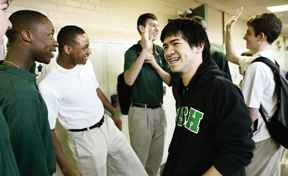Talking About Culture Shock

KRT
Understanding diversity in the American salad bowl.
April 20, 2005
BY YASUHITO YAMAMOTOStaff Writer
The U.S.A. is often described as “a melting pot” where various kinds of people and cultures mingle with each other. But it might be more accurate to describe it as “a salad bowl” in which each element contributes to the whole but exist largely without fully interacting with one another. This unfortunate relationship seems to have increased especially during the last few years with this country proudly imposing its own idea of democracy on others, while ignoring their own unique values. To solve this problem, our understanding of other cultures is essential. On April 28, the UMB Wellness Center will open up a discussion on the issue of culture shock to educate us on the different values that exist in our society.
This event is the third of a series of three that the Wellness Center has had focusing on culture: the first, “What a culture is,” the second, “What a culture crash is,” and this time, the third, “What a culture shock is.” When asked why the need to hold this series of discussions, Edna Pressler, a staff psychologist of UMB and the organizer of this event, said, “Many students have addressed their needs in an issue of culture shock, such as an issue of language difficulty, intense loneliness, and a family expectation.” In fact, for many immigrant students and international students, struggles in cultural differences could be a daily occurrence, and their inability to identify the cause of their struggle often causes them to see the faults as their own. “Understanding a different value in cultures helps them to overcome culture shock,” explains Pressler.
Cultural difference can be found in your class, too. In some cultures, individual effort is more focused, and in others, collective work is regarded as important and standing-out as an individual is seen as a threat to a group work. With a background that focuses on collective work, the student may not be able to speak up his/her original opinion during a discussion. Here in the United States, where class participation is highly evaluated, a student with such background may receive a lower grade, and they tend to think that the responsibility belongs only to them.
Therefore, knowing what a culture difference is and why a culture shock happens is essential for immigrant and international students to have a confidence in who they are while absorbing a new culture and retaining their original one, in order to establish a unique cultural experience. However, the issue of culture differences and this event are important as well for students with a background in U.S. culture.
“In the future, hopefully many students will go out and travel to other countries. Then, they’ll probably face an issue of culture shock,” says Edna Pressler. Besides, even if they don’t go out from the United States, “UMass has a great diversity of students, and it’s very useful to know the process of culture shock; how many students face and struggle with this issue and try to overcome it.” Indeed, informed with the experiences of culture shock, professors and students will be able to create a more open discussion, and then, more diverse opinions will be provided in a class. This is why UMass is proud of its diversity of students, isn’t it?
During this semester, the UMB Wellness Center has also offered a series of film show through which they introduced a culture of Japan, Korea, China, and India. In the coming event, Pressler plans to show a video made by another college and contains interviews with students on an issue of culture shock, followed by a discussion.
Understanding a different culture and its value is essential for any student, professor, or adviser to have more of an open conversation that can only enrich our learning experience. And, only when we do so, will we be able to fully appreciate the diversity of students in UMass. This understanding is inevitable, too; for in today’s world it’s impossible to live without cooperating and interacting with people from other cultures.
The UMB Wellness Center’s discussion on culture shock will be held from 1 to 2:15 on the next Thursday. For more information, call Edna Pressler at (617) 287-5690 or e-mail [email protected].










































































